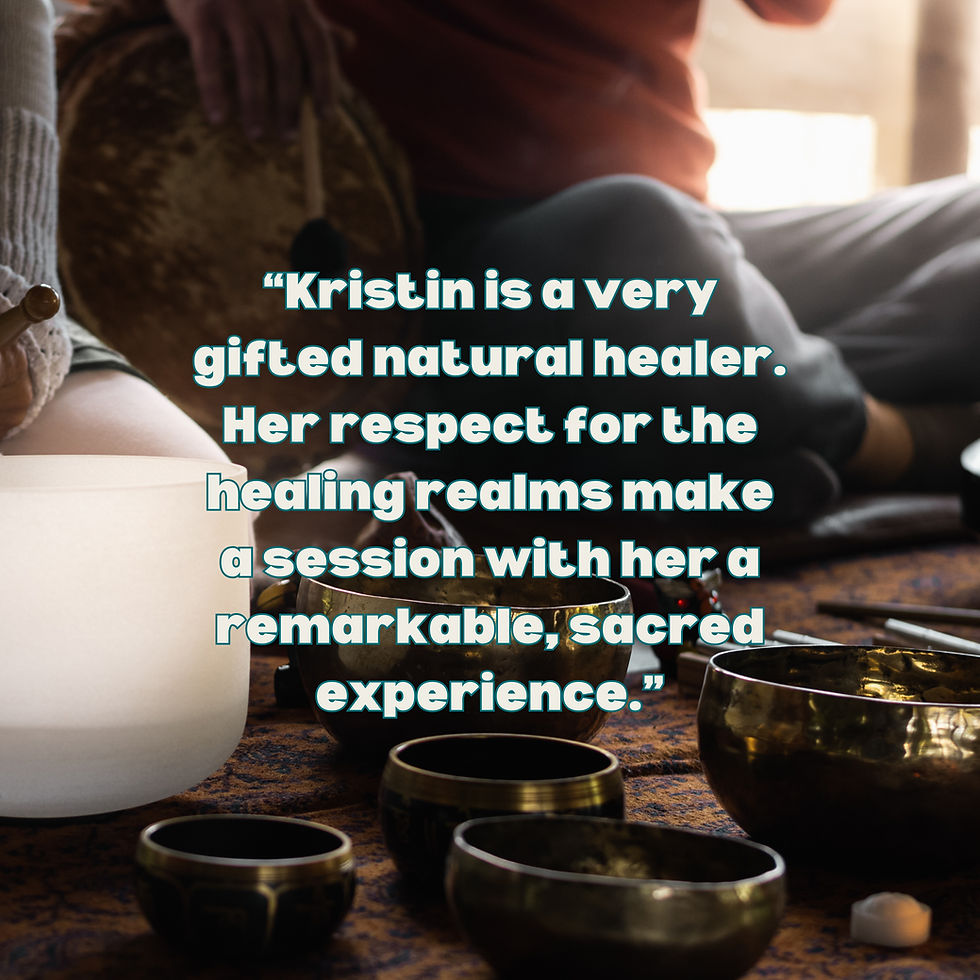Reiki + Sound Immersion for Autistic People and Their Caregivers
- Kristin Irwin
- Oct 6
- 3 min read
How gentle energy work and vibration-based sound sessions can support regulation and caregiver wellbeing.
At Devotion Studio, sessions with people who experience autism and their caregivers have allowed me to witness how non-verbal approaches like Reiki and Sound Immersion create a safe bridge into nervous-system regulation and stress relief. This experience is low-risk, sensory-rich, and often deeply calming.
What people often notice after Reiki and Sound Immersion
For autistic participants
Improved sensory regulation and reduced agitation. Low-frequency vibration, or felt sound, and carefully paced soundscapes can lower agitation in some people. Each session is individualized and sensory preferences are respected by previewing each sound separately prior to the session.
Better attention and emotion-regulation. Pilot studies of vibroacoustic therapy report gains in attention and emotion regulation for autistic children because tactile and vestibular (inner ear) vibration can provide predictable sensory input that the nervous system uses to stabilize arousal.
Non-verbal communication windows. Music and sustained tones offer a “language” that many non-verbal or minimally verbal people can respond to in a low-pressure setting.
For caregivers
Reduced caregiver stress and physiologic arousal. Clinical studies indicate Reiki sessions can reduce perceived stress and some physiological markers (blood pressure, pulse) in caregivers and health-workers; caregivers often report better sleep and less burnout after regular sessions.
Calming ritual. The gentle presence of a hands-off practitioner, a predictable session structure, and guided breathing and visualization meditation support higher-level regulation for everyone present. Caregivers often benefit simply from a supportive, restful space.
What the science suggests
Entrainment & brain rhythms. Sounds of sustained tones and low frequencies influence brainwave patterns, increasing alpha/theta activity associated with relaxation and decreased hypervigilance. This neural entrainment can support a shift from 'heightened vigilance' to a calmer state that’s more receptive to learning and social engagement.
Proprioceptive / interoceptive input through vibration. The gong, crystal bowls, and shruti box deliver vibrations that the body feels and interprets as predictable sensory input. For people with sensory differences, predictable vibration can increase a sense of internal order and reduce dysregulated behaviors.
Research is promising but evolving. Several studies and reviews show positive signals (especially for music therapy); vibroacoustic research is growing but still preliminary and often small-sample. Reiki evidence for caregiver stress is stronger than claims about direct effects on core autism symptoms.
How we design sessions at Devotion Studio
Introduction to the studio and myself. I ask about sound tolerance, touch preferences, triggers, and prior responses to music/sensory inputs. We look around the studio together to become familiar with the session's environment.
Sessions are predictable and flexible. Many autistic people prefer to observe a short demo of the sounds first. I give a short overview of what to expect, utilize clear start/end cues, visual supports, and welcome the option to sit up, move around, or leave the room. Guardians/caregivers are welcome to stay and enjoy the session while the other guest moves around the studio space.
Offer Reiki sessions as self-care for the caregiver. Short caregiver sessions (even 15–30 minutes) focused on stress reduction can have noticeable benefits and support sustained caregiving capacity to avoid burnout.
Realistic expectations. These approaches are meant to aid regulation and wellbeing. They do not replace other interventions. If guests do not wish to proceed with the session, we simply stop, check in, and discuss our options.
Want to try it?
If you or your loved one are curious, let's chat on the phone or over email. We will co-design the first session so it’s safe, comfortable, and useful.
Location: 2055 Albany Post Rd, Croton
Connect: Devotion@theDevotionStudio.com
Phone: 737-471-9933
Social: @theDevotionStudio
.jpg)









Comments